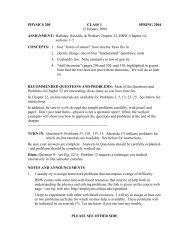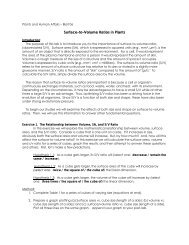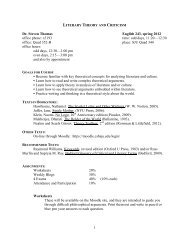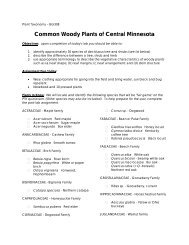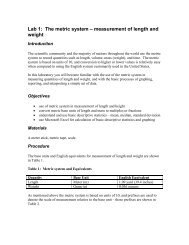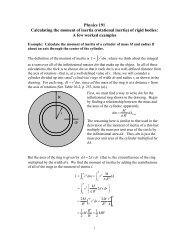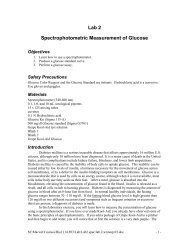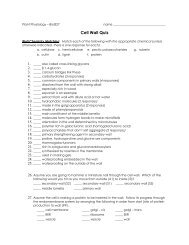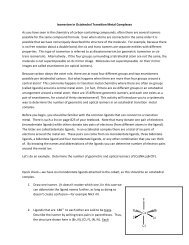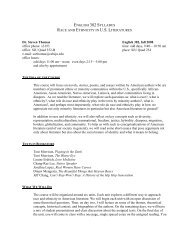Karl Marx Economic and Philosophical Manuscripts of 1844 Wages ...
Karl Marx Economic and Philosophical Manuscripts of 1844 Wages ...
Karl Marx Economic and Philosophical Manuscripts of 1844 Wages ...
Create successful ePaper yourself
Turn your PDF publications into a flip-book with our unique Google optimized e-Paper software.
21This means that, quite apart from competition, theaccumulation <strong>of</strong> large capital takes place at a much faster rate thanthat <strong>of</strong> small capital. But, let us follow this process further.As capitals multiply, the pr<strong>of</strong>its on capital diminish, as a result<strong>of</strong> competition. So, the first to suffer is the small capitalist.“In a country which had acquired its full complement <strong>of</strong>riches, ... as the ordinary rate <strong>of</strong> clear pr<strong>of</strong>it would be verysmall, so the usual market rate <strong>of</strong> interest which could beafforded out <strong>of</strong> it would be so low as to render itimpossible for any but the very wealthiest <strong>of</strong> people to liveupon the interest <strong>of</strong> their money. All people <strong>of</strong> small ormiddling fortunes would be obliged to super-intendthemselves the employment <strong>of</strong> their own stocks. It wouldbe necessary that almost every man should be a man <strong>of</strong>business, or engage in some sort <strong>of</strong> trade.” [Smith I, p. 86]This is the situation most dear to the heart <strong>of</strong> politicaleconomy.“The proportion between capital <strong>and</strong> revenue, therefore,seems everywhere to regulate the proportion betweenindustry <strong>and</strong> idleness. Wherever capital predominates,industry prevails: wherever revenue, idleness.” [Smith, p.301]But, what about the employment <strong>of</strong> capital in this increasedcompetition?“As the quantity <strong>of</strong> stock to be lent at interest increases, theinterest, or the price which must be paid for the use <strong>of</strong> thatstock, necessarily diminishes, not only from those generalcauses, which make the market price <strong>of</strong> things commonlydiminish as their quantity increases, but from other causeswhich are peculiar to this particular case.“As capitals increase in any country, the pr<strong>of</strong>its whichcan be made by employing them necessarily diminish. Itbecomes gradually more <strong>and</strong> more difficult to find withinthe country a pr<strong>of</strong>itable method <strong>of</strong> employing any newcapital. There arises, in consequence, a competitionbetween different capitals, the owner <strong>of</strong> one endeavoringto get possession <strong>of</strong> that employment which is occupied byanother.“But, on most occasions he can hope to jostle that otherout <strong>of</strong> this employment by no other means but by dealingupon more reasonable terms. He must not only sell whathe deals in somewhat cheaper, but, in order to get it to sell,he must sometimes, too, buy it dearer.“The dem<strong>and</strong> for productive labor, by the increase <strong>of</strong>the funds which are destined for maintaining it, growsevery day greater <strong>and</strong> greater. Laborers easily findemployment, but the owners <strong>of</strong> capitals find it difficult toget laborers to employ. Their competition raises the wages<strong>of</strong> labor <strong>and</strong> sinks the pr<strong>of</strong>its <strong>of</strong> stock.” [Smith p. 316]The small capitalist, therefore, has two choices: he can eitherconsume his capital, since he can no longer live on the interest—i.e., cease to be a capitalist; or, he can himself set up a business, sellhis goods at a lower price, <strong>and</strong> buy them at a dearer price than thericher capitalist, <strong>and</strong> pay higher wages, which means that hewould go bankrupt—since the market price is already very low asa result <strong>of</strong> the intense competition we presupposed. If, on the otherh<strong>and</strong>, the big capitalist wants to squeeze out the smaller one, hehas all the same advantages over him as the capitalist has over theworker. He is compensated for the smaller pr<strong>of</strong>its by the larger size<strong>of</strong> his capital, <strong>and</strong> he can even put up with short-term losses untilthe smaller capitalist is ruined <strong>and</strong> he is freed <strong>of</strong> this competition.In this way, he accumulates the pr<strong>of</strong>its <strong>of</strong> the small capitalist.Furthermore: the big capitalist always buys more cheaply thanthe small capitalist, because he buys in larger quantities. He can,therefore, afford to sell at a lower price.But, if a fall in the rate <strong>of</strong> interest turns the middle capitalistsfrom renters into businessmen, conversely the increase in businesscapitals <strong>and</strong> the resulting lower rate <strong>of</strong> pr<strong>of</strong>it produce a fall in therate <strong>of</strong> interest.“But, when the pr<strong>of</strong>its which can be made by use <strong>of</strong> acapital are diminished... the price which can be paid for theuse <strong>of</strong> it... must necessarily be diminished with them.”[Smith p. 316]“As riches, improvement, <strong>and</strong> population, have increased,interest has declined”, <strong>and</strong> consequently the pr<strong>of</strong>its <strong>of</strong>stock; “...after these are diminished, stock may not onlycontinue to increase, but to increase much faster than22



